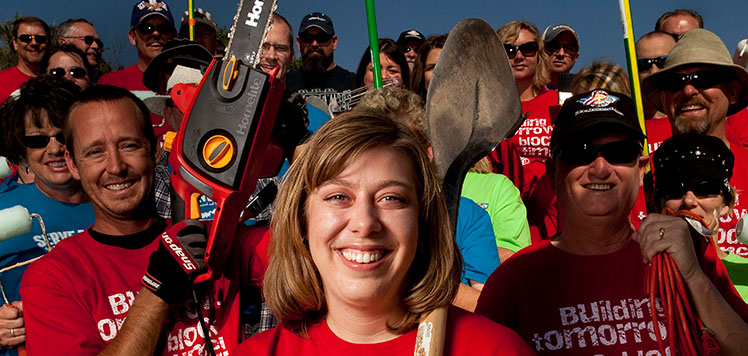This week, we speak with Angela Bomgaars, executive director of Extreme Community Makeover (ECM). ECM is based out of the Westwood neighborhood of Denver and has been serving Denver communities since 2008.
1. Tell us about you and your organization and the social change you are trying to achieve.
“Extreme Community Makeover (ECM) is a nonprofit that works in specific neighborhoods in Denver with outside home and yard improvement projects, involving painting, yardwork, landscaping, and utilizing volunteers to do so. Our goal is to be a good neighbor, help with neighbors’ yard projects and bring people together for improved community connection. Our model is that we go into neighborhoods a couple weeks ahead of time, knock on people’s doors, let them know about the organization and ask whether they want to receive these services. We base the provision of services on the responses to those contacts.”
“Extreme Yard Care is the social enterprise piece. I went through one of the first ever social enterprise academies at Joining Vision and Action (now called Social Enterprise Base Camp). From that, we launched a lawn care business where we’re trying to employ people in the neighborhoods that we serve through providing quality, affordable lawn care (e.g., mowing, blowing, edging, trimming, etc.). [ECM] doing a one-time volunteer project is often not enough to care for the lawn in the long-term, so this social enterprise complements that, offering more consistent and faster service. We’re already getting requests and sorting out what the future growth will be for the company. We’ve hired a few people so far who were in need of jobs in the neighborhoods we serve. The service is available to anyone in Denver—and at a reduced price in the neighborhoods we serve. Ultimately, the social enterprise’s profits would feed into supporting the nonprofit’s efforts.”

2. What keeps you inspired and going when things get tough?
“I really like the process of starting new things. I like the challenge of that and being stimulated by what I’m learning. Things aren’t always going to go how you plan, but it forces you to be creative in figuring out problems and generating ideas and solutions. Doing nonprofit work, you’re hopefully doing work that impacts people’s lives; day-to-day, it’s putting together volunteer opportunities that enable people to serve in their local community and have an opportunity to connect with neighbors in their local community. I like the challenge of it.”
3. What advice would you give to someone who is trying to create a social enterprise?
“It’ll be full of challenges—have fun with it! It took a lot longer than I ever anticipated. A lot of it is timing: figuring out what the right time is [to launch]. Bring together a team and a broader group of people also invested in it to get their input on its direction. Having enough supporters and conversations from the beginning creates investment and a sense that contributors have a ‘stake’ in it, which will help sustain the organization.”
4. How have you worked with Joining Vision and Action (JVA), and how has that helped your organization?
“I’ve done many trainings with Joining Vision and Action: the Social Enterprise Base Camp, the Executive Director Academy, the Development Director Intensive, and more. What I’ve appreciated about JVA is not only do they have a wide variety of types of trainings, they also have a wide variety of people who are presenting trainings—people who have worked in the field and are not just presenting research. It’s a great combination of the research aspect and the practical experiential aspect. JVA staff have always been great to work and connect with, and have a strong desire to see the organizations they’re working with achieve success. So when you see them again, they remember you and are asking about how things are going with your project’s development … You can tell the people who work at JVA care about what they do and seek strong relationships with people involved in hands-on ways with creating community change. I’ve also greatly enjoyed the opportunities to connect with the people in JVA’s trainings and community, like other local changemakers.”
5. What else would you want to share with us that we haven’t asked?
“Sometimes I think we get so locked into our daily routine and mindset. Sometimes a lot of small things add up to a big impact. To be a changemaker, all you need is to show up and do something. Take whatever you have where you are and do something with it—it can be your skills, resources, talents, etc. Get out there and do something!”







Leave A Comment